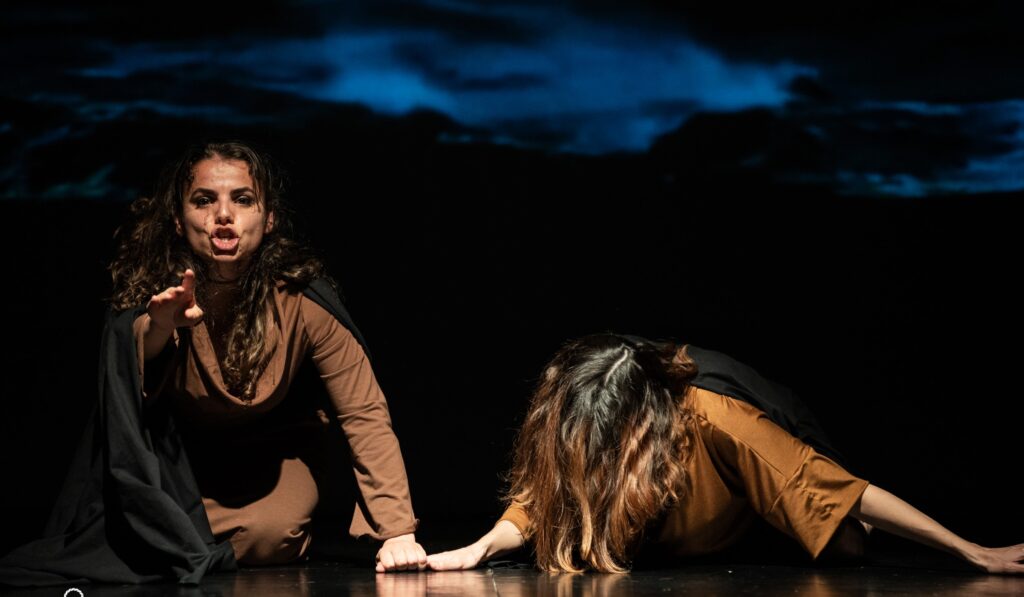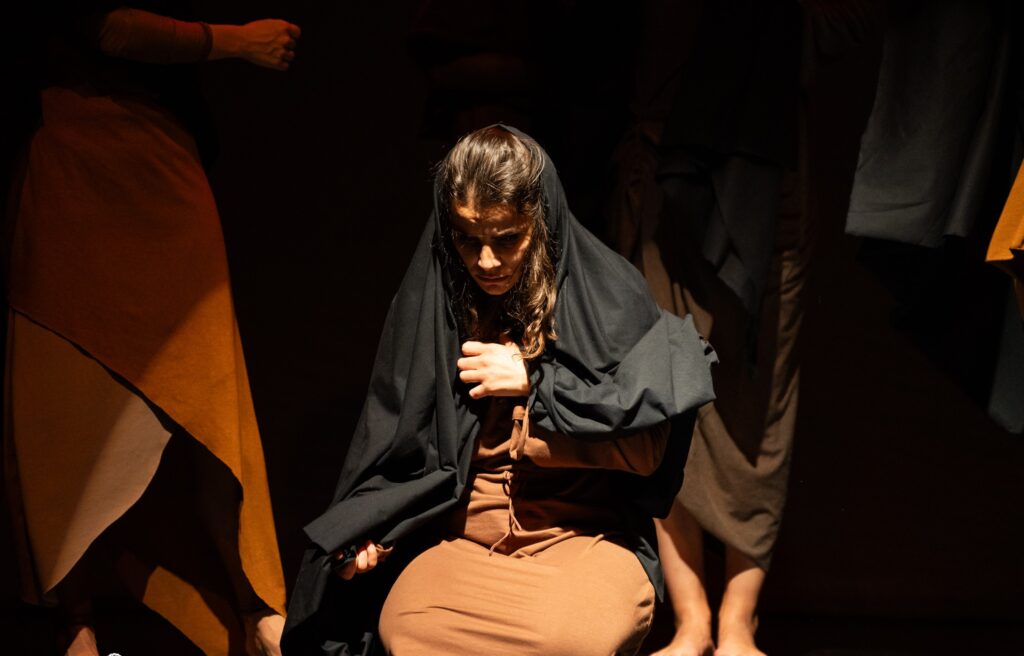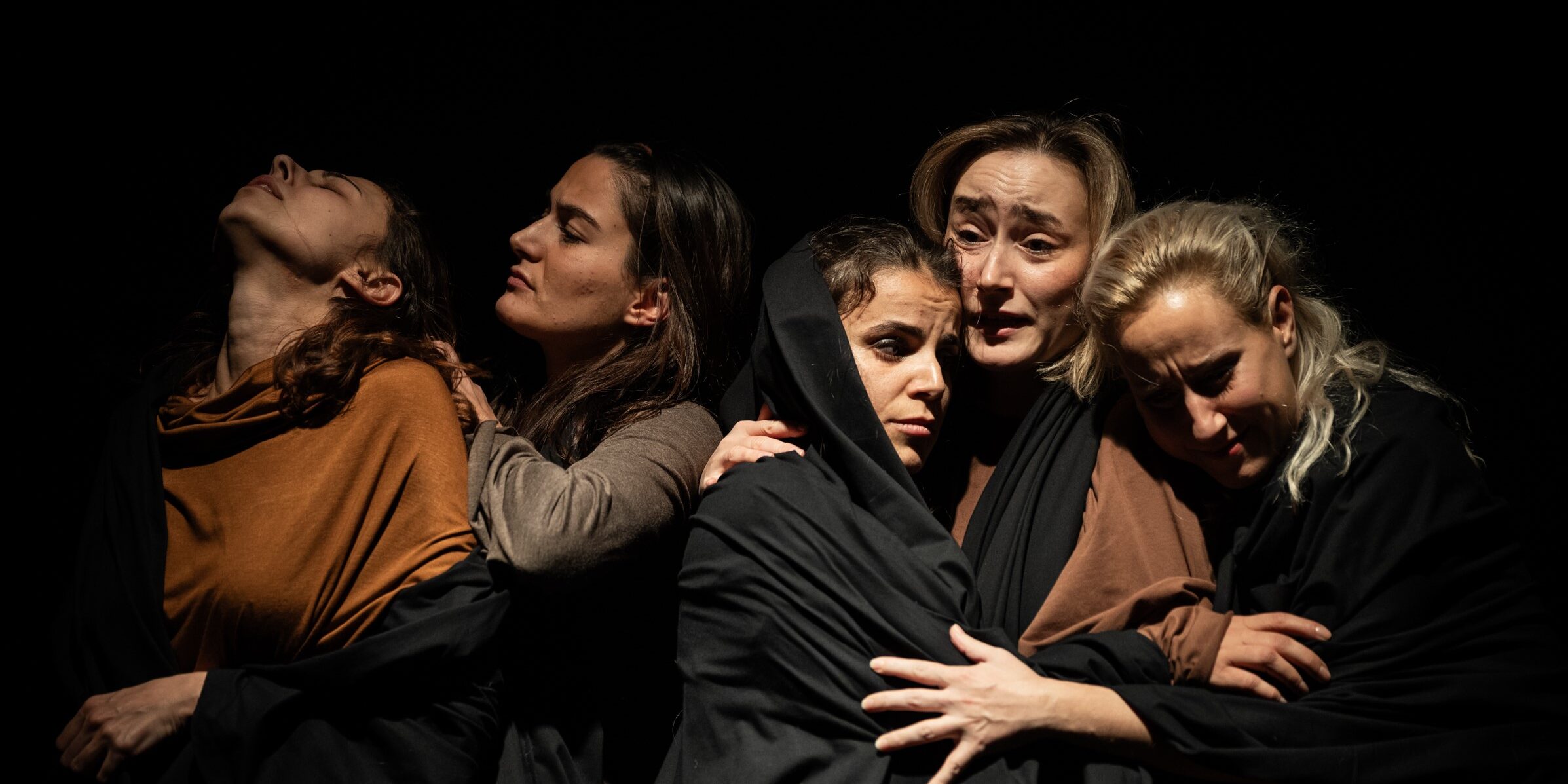Trojan Women – Replica is an ambitious cross-cultural coproduction between Kosovo’s Artpolis and Serbia’s DAH Theater. Florida Kastrati talks to the cast and directors about the piece’s unique development process in Belgrade and Prishtina.
An actress is playing the piano while humming quietly. One by one her co-performers join in, their melodiously humming voices creating a beautiful symphony. It is enchanting. After this exercise, the performers launch into their usual warm-up activities, before the real work begins.
On 23rd November at the Dodona Theatre in Prishtina, a work-in-progress performance of Trojan Women – Replica was presented to an invited audience of theatre makers, theatergoers, and teenage activists. The 40-minute presentation was the work of a group of artists from Artpolis, an NGO from Prishtina and DAH Theater, an independent artistic collective and research centre from Belgrade. There has been an artistic and activist relationship between these two organizations for more than a decade.
The Trojan Women – Replica troupe consists of nine artists from both countries and the project was led by two directors Zana Hoxha from Artpolis and Dijana Milošević from DAH Theater in Belgrade.
I’ve been following the development of the show, since their initial meeting in Belgrade. Many new elements and ideas have been added from the last time I saw it performed. The performers say the names of women who have been forgotten by history. They are the Greek, Serbian, and Albanian women whose stories have been wiped from the face of the earth. It’s a thought-provoking scene and one that makes you question how many women in your family have spent a lifetime dedicated to the service of others, whose contribution was never acknowledged and whose name was never mentioned after their death despite their contribution to the society in which they lived?
In the play, which draws from Aristophanes, the Classical Athenian comic playwright, and his counterpart Euripides the tragedian of Athens. the actors take the names of different ancient Greek women – Andromache, Athena, Hecuba, Polyxena, and Cassandra. Four male actors are also part of the ensemble.
The Gods are also portrayed as the decision-makers, playing with common people’s fate like modern politicians. The performance switches between ancient and modern, directly critiquing the hypocrisy of the modern world.
Trojan Women-Replica takes from Euripides The Trojan Women, singling out timeless themes that speak to women of this century, inspecting them through a feminist lens. The play explores the fate of women throughout centuries. As director Zana Hoxha explains, this drama especially relates to women in countries with a recent history of conflict:
“Women are direct victims of war and as we have seen in our region, men in most cases leave to fight and women remain to take care of the rest of the family. This play doesn’t talk only about women’s role in the real wars, but also the everyday war that women fight, their resistance, efforts, and also achievements or results that women have in different fields,” she says.

Trojan Women Replika. Photo: Esad Duraki
A dialogue between Hecuba and Poseidon takes place in Albanian and Serbian, which means many in the audience only understand what one of them is saying. Yet, to understand and know the full story, just as in history, one needs to hear both parts.
Artpolis also helped created the first feminist festival in the Western Balkans, FemArt, while DAH Theatre is similarly committed to creating art that initiates positive social change. Before they gathered in Belgrade in September, the troupe had never worked together before, yet there existed a chemistry and connection between them that had only grown by the time of the presentation in November.
The two directors conceptualized the play together. Director Dijana Milošević, co-founder and Artistic Director of DAH Theater, adds: “We wanted to see what the shared pain and experience between Greeks and Trojans, like that of our two countries. The Trojan women are Serbian and Albanian. The Trojan Women are all women. We are making this play for them.”
The importance of this project lies in its cross-culturalism. The production has one person from each country involved in all three production processes (directing, dramaturgy, and production management), as well as among the ensemble, thus combining the styles of working from both Serbia and Kosovo, in an attempt to include different perspectives and angles in all aspects of the production.
As mentioned, the play also uses the languages of both countries (and English in a short scene). It also aims to encourage our divided communities towards a collective vision of peace, compassion, acceptance, and the understanding that comes with sharing stories and experiences, by working together and making theater. In political terms, this is an anti-chauvinist project that aims to diminish the exaggerated myths that media and politicians have created between our communities.
For most of the artists, working together in this way, in a play where both Serbian and Albanian are used, felt experimental and new. With its bilingualism, the play also looked to address the hate that still comes with speaking and hearing each other’s languages.
Throughout both phases of its development, in Belgrade and Prishtina, I had the opportunity hear the actors’ impressions and to talk to almost everybody from the artistic group. I was left with a sense that this play has awoken in each of them something personal, something they need to mend. You could see that in their commitment to the project.
“We need to fight against what the media and our governments are telling us”
The stories they found while working together also told a lot about what this play is about. Blerta Gubetini, one of the performers in the play added: “This project made our research further and on other levels, and for the first time I learned that during the 98-99 war, a peace activist group from Serbia called “Women in Black” [the group is still active today] protested in Belgrade during the war with banners calling on sisterhood and unity for peace. “
Another cast member, Milica Petrović from DAH Theater, adds: “We need to see each other as human beings, as people, through this play, we are fighting against what government and politics have been telling us.”
This need to challenge narratives peddled by the media and the politicians was especially apparent to the Serbian actors who were visiting Pristina for the first time: “To tell you the truth I hesitated to come in Kosova judging on in the media and what they have told us. I see that Prishtina is quite a welcoming city and there’s a European atmosphere here and it is great that we have united to work on this play,” said actor Zoran Vasiljević, when he and the DAH Theater troupe came to Pristina for the second phase of the project.

Trojan Women Replika. Photo: Esad Duraki
One line that is repeatedly used in the play is: “The woman was first”, and when asked to elaborate on this choice by an audience member, dramaturg Jadranka Andjelić replied: “What we have tried from the beginning and we have agreed on is that the show should not be a reflection of “Women’s Fate” because all of us, when we have discussed it, have pointed out that it is time for this to change, even for us as stage artists and we don’t want theater to reproduce such scenes, as much as possible and as much as we have the opportunity to change this fate.”
On the process of creation, director Zana Hoxha added: “We chose a loose and open process of working on this play because we believe it will help us to create togetherness of what we really want. As a team, co-creation will help us exchange all of our ideas across Pristina or Belgrade.”
Trojan Women – Replica is an attempt to resolve our experience of traumas of war in a peaceful and transcendent way. It tries to illustrate the potential of art to penetrate beyond language, while promoting compassion, understanding and peace. Moreover, it’s a story about the oppression and freedom of women, of finally being released from Trojan slavery and from centuries-old chains.
Trojan Women – Replica is among the central events of the “Culture for Change: Towards Better Relations between Serbia and Kosovo through Art and Youth Activism” project. There is still some way to go before this production is finished, of course, but it has been fascinating to see it develop. Rehearsals will continue in Prishtina and Belgrade in 2024, with the goal to show it in front of audiences in Belgrade and also in Pristina.
- This text was supported by Artpolis.
For more information, visit: Artpolis-ks.com and Dahteatarcentar.com
Florida is a lover of words, and of art in all its forms: fiction, poetry and drama.








